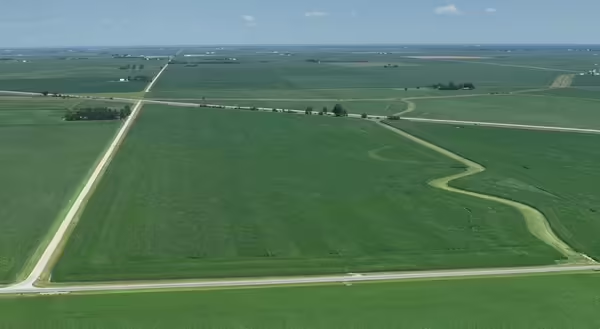
As a teenager, one of my farm duties was cultivating the weeds out of the corn and soybeans. I preferred to drive our bigger tractor because it was easier to handle, but the cultivator was mounted on the back which posed some additional challenges to the job at hand.
Back in those days, GPS was not an option. So I would have to keep an eye on the crop ahead of me and the equipment behind me. If I didn’t stay in the rows, I could tear out the crop. And it only took a few inches off track and I was in trouble. If I ignored the cultivator and it got clogged with bindweed it would rip the plants out of the ground. Both scenarios were ones I tried to avoid.
I feel like I got my first taste of drones when our local fertilizer company, C and J Fertilizer (now long gone) provided a “Fly Day” for its customers. They lined up pilots who gave rides to the farmers to fly over their fields to check on their crops.
I can remember, one year in August, going up with my dad in a small Cessna airplane. I was amazed at what I could see from up there. As the pilot would steeply bank the airplane, Dad would gaze intently at his crops. Dad could clearly see from up there the places where crops were missing. I had cultivated out small areas of weeds and crops. Dad would point it out, and I’d be embarrassed. Looking back my embarrassment really wasn’t that warranted.
Dad did all the planting and to be fair, he wasn’t very good at keeping planting rows straight, which made my job even harder. The jobs were tedious and required concentration – both the planting and cultivating. Still, I loved being out on the tractor in the sun, my nose pleased to smell the black Pella soil turned over as I was ripping out the weeds. I could see from my tractor perch just about everything that was going on for miles when I glanced away from my task at hand.
As we flew over the farm, I could also see thin spots, where the plants weren’t growing well from early season ponding, and lighter green spots where areas on small hills were drying out. By this time in August, I could spots where plants were showing signs of running out of nitrogen. And I could see the weed patches, cocklebur or Jimson weeds, growing in abundance. The view and the insights I could see from the air was amazing.
Years later, as a farm manager, I was thrilled to have a drone to inspect crops. Rather than waiting for a “Fly Day”, I could take the drone out and inspect fields any day weather conditions permitted. I could fly the drone over the field several times during the growing season and keep track of what was happening in the field. I was getting a “bird’s eye view” of the crops. Droning my fields gave me important insights on what needed immediate attention and notes for changes to implement next year.
Drones have become a valuable tool that I feel we can use to better manage our farms. As the new season begins, the potential for good yields is high. But as the growing season progresses, there always seems to be negative events that happen that can diminish the yield. Drones are a way we can easily gather that information that will play a role in our ability to optimize our yields.
This is the first in a series of articles about using drones to support your farm management practices. Stay tuned to my blog Farm Coach to learn how to get started with drones, using them to help increase your yield, and more.
MEET THE AUTHOR
Kevin Brooks is the Farm Business Management and Marketing Educator for Fulton, Mason, Peoria, and Tazewell counties. He grew up on a corn and hog farm in Iowa. He received his bachelor of science degree in agriculture business from Truman State University and his master of science degree from University of Missouri in agriculture education.
Kevin is licensed in Illinois as a real estate broker with harVestco LLC in Champaign, IL. He has professionally managed and consulted on over 25,000 acres of farmland and marketed grain for farm management customers as a professional farm management and trust officer. Kevin has taught Farm Management, Agri Business Management, Crop Science, Crop Production, Soil Science, Pesticide Application, Grain Marketing, and General Horticulture at the college level.
Kevin holds agriculture teaching certifications in Illinois and Missouri. He is also a commercially licensed UAS (drone) pilot holding an FAA Part 107 license. He has worked in agricultural input sales (farm chemicals and seed) and is trained in agronomy through Purdue University and Iowa State University. Early in his career he worked for USDA, as a Farm Management Specialist, working primarily on farm loan analysis.
Follow Kevin on Facebook and YouTube.
ABOUT THE BLOG
Farm Coach helps farmers and landowners navigate the rapidly changing farm management environment of today's world.